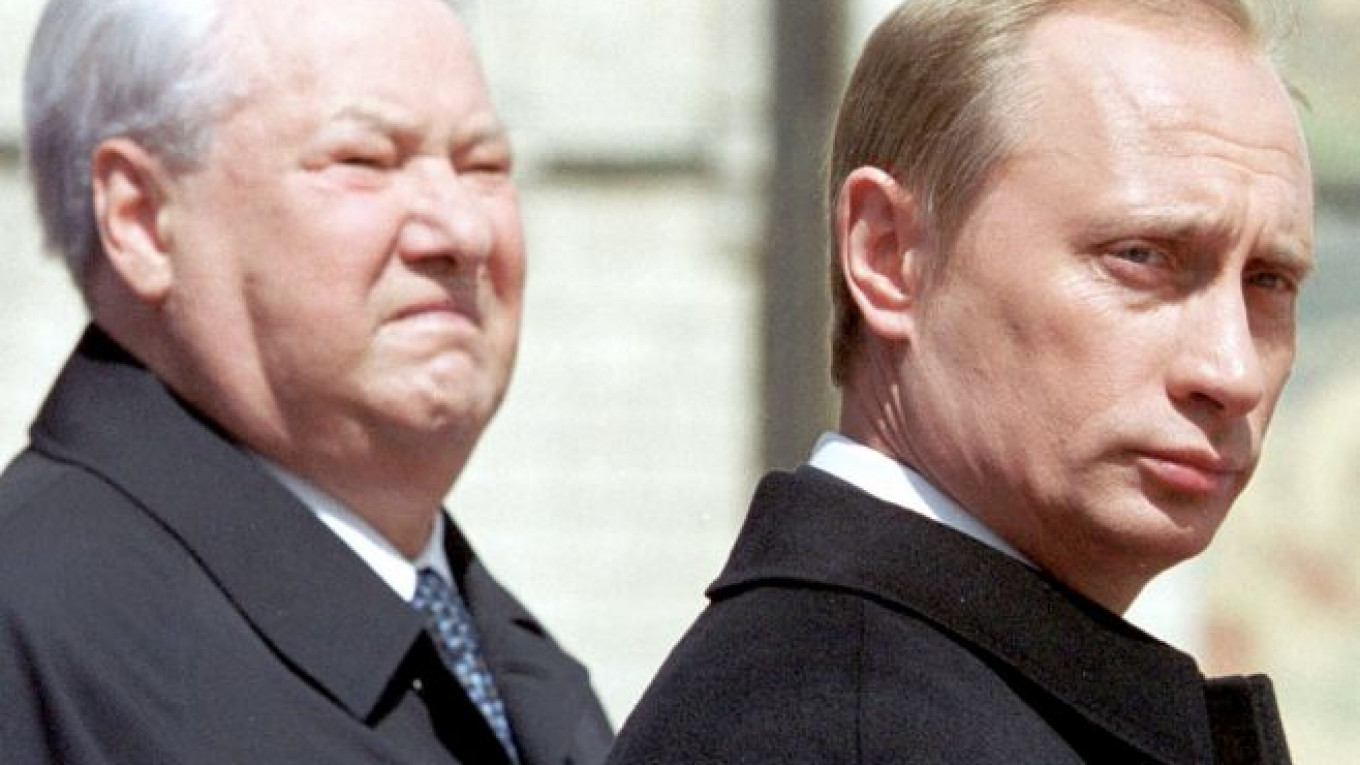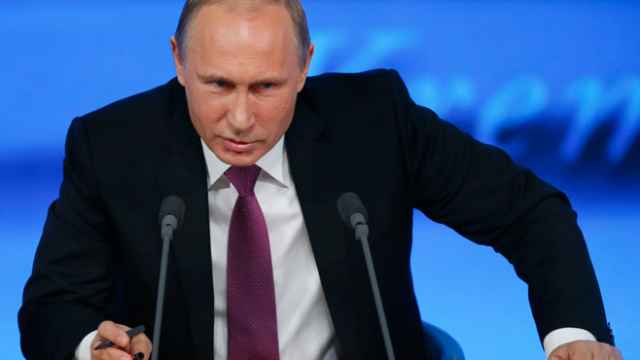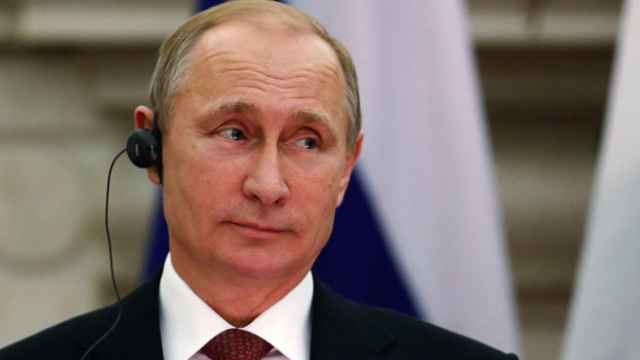When Vladimir Putin was handed power unexpectedly by an ailing Boris Yeltsin on the last day of the last century, his first move was to go on television to guarantee Russia the freedoms needed for a "civilized society."
Fifteen years later, his critics accuse the former KGB spy of sacrificing emerging political and economic freedoms to the idea of Soviet-style glory, bringing the country close to economic collapse and international isolation over Ukraine.
Opinion pollsters say his ratings are at near record highs and a groundswell of protest is unlikely in the near future.
But the financial stability his first spell as president brought — on the back of high energy prices — is threatened by the oil price drop and the ruble's slide against the dollar.
Putin's fate and that of the system he has built around him now depend largely on how he handles the deepening economic crisis and the conflict in Ukraine.
"Asking whether Putin can win the election due in 2018 is no longer the right question," Gleb Pavlovsky, a former Kremlin spin doctor, told Reuters. "Putin is focused on staying on the horse, but it is very difficult. The question now is not whether Putin stays on, but whether the horse survives."
Putin's allies remain united behind him and portray him as a strong leader who rescued Russia from economic and political chaos under Yeltsin in the 1990s, the first decade after the collapse of the Soviet Union.
Sergei Ivanov, the head of the presidential administration, was widely quoted in October as saying: "Putin is Russia."
Putin and his allies blame the economic problems on what they call external factors, principally the West. Others, including former allies who worked with him, say he is out of touch and incapable of rescuing Russia from crisis.
"He used to have the image of a survivor who can handle problems and solve them, despite all difficulties. He was seen as the lucky guy. But now we are in probably the worst crisis since the Soviet Union collapsed," said Vladimir Milov, an ex-deputy energy minister.
"Putin has demonstrated he has no plan. There is nothing in his pocket."
Missed Opportunities
Milov, who has entered the opposition, described the last 15 years as a period of missed opportunities.
When a faltering Yeltsin surprised the world by announcing his resignation on state television and naming Putin acting president on Dec. 31, 1999, the new leader set out his initial plans the same day in a short televised address to the nation.
He said the state would protect the freedoms of speech, conscience, mass media and property rights — what he called the "fundamental rights of a civilized society".
At 47, the ex-KGB spy and prime minister was seen by many Russians as the man to revive past glories, and he was easily elected president in 2000. He burnished his image with stunts such as flying with migrating cranes or riding horses with a bare torso.
Putin tightened his grip by reining in the media, crushed a rebellion in the Chechnya region, restored Kremlin control over the country's other independent-minded regions, and watched as the economy boomed until the global financial crisis of 2008.
Putin also used arbitrary methods to clip the wings of the businessmen known as oligarchs, who had amassed influence as well as massive wealth in the sell-off of state assets in the 1990s.
One, Mikhail Khodorkovsky, then Russia's richest man, spent 10 years in jail on theft and money laundering charges after falling out with Putin. His Yukos oil empire was broken up and sold off, mainly to the state and Putin allies.
Some critics say that was a turning point after which political and economic freedoms were limited and that Putin had by this time abandoned any genuine attempt to build ties with the West, feeling his approaches had not been taken seriously.
Lev Gudkov, head of the independent Levada Center polling group, says the multi-party political system was eliminated in all but words.
"Of course it is not Stalinist totalitarianism and mass repressions, but there are nevertheless now 'prophylactic repressions'," he said, referring to opposition leaders who are behind bars or under house arrest.
Support
The economic system of heavy state intervention, often known as "state capitalism," continued through the 2008-09 global financial crisis and the 2008-12 presidency of Dmitry Medvedev, an ally who stood in for Putin because of constitutional limits.
During that time, Putin remained Russia's most powerful man as the dominant member of their power-sharing "tandem" and was re-elected in March 2012 despite mass rallies against him.
Since then, the economy has been found wanting, with recession looming, annual inflation hitting 9 percent in November and set to rise in 2015, and currency and gold reserves being depleted as the Central Bank tries to shore up the ruble.
"Russia is going into decline. It means the model which Putin created — capitalism for friends — has already collapsed," Mikhail Kasyanov, Putin's prime minister for much of his first four-year term, said in an interview.
Like other opponents, he says Putin failed to use the boom years to build infrastructure such as roads, did not wipe out rampant corruption and spent vast sums on what critics say were vanity projects, such as the 2014 Sochi Winter Olympics.
For now, the political and business elite are united behind Putin. He is still benefiting from a surge in popularity over the annexation of Crimea, even though it brought Western sanctions on Russia, and over his support for Ukrainian separatists fighting to break away from Kiev's rule.
But Gudkov says discontent is growing over the economy and euphoria over Crimea will soon fade. Putin, he says, has enough support to ride out the dissatisfaction for the next 18 months to two years, but discontent will start to grow in the spring.
A Message from The Moscow Times:
Dear readers,
We are facing unprecedented challenges. Russia's Prosecutor General's Office has designated The Moscow Times as an "undesirable" organization, criminalizing our work and putting our staff at risk of prosecution. This follows our earlier unjust labeling as a "foreign agent."
These actions are direct attempts to silence independent journalism in Russia. The authorities claim our work "discredits the decisions of the Russian leadership." We see things differently: we strive to provide accurate, unbiased reporting on Russia.
We, the journalists of The Moscow Times, refuse to be silenced. But to continue our work, we need your help.
Your support, no matter how small, makes a world of difference. If you can, please support us monthly starting from just $2. It's quick to set up, and every contribution makes a significant impact.
By supporting The Moscow Times, you're defending open, independent journalism in the face of repression. Thank you for standing with us.
Remind me later.






